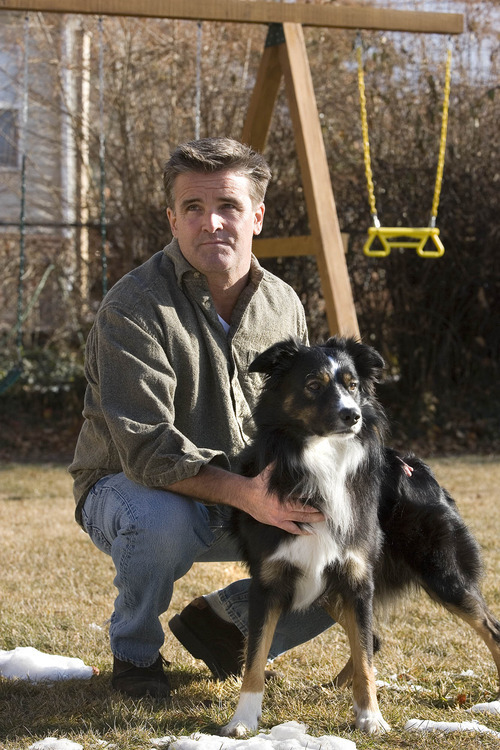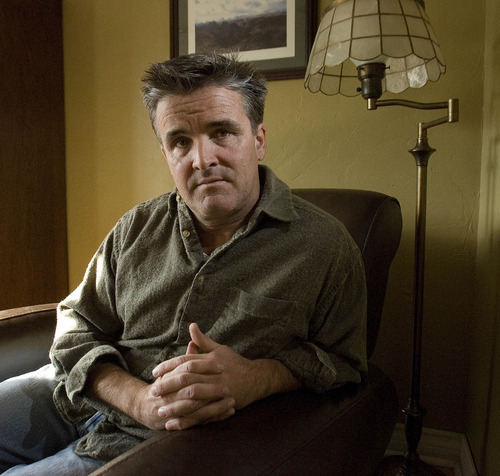This is an archived article that was published on sltrib.com in 2012, and information in the article may be outdated. It is provided only for personal research purposes and may not be reprinted.
Maximilian Werner's book Crooked Creek carries the title and image of a slow, lumbering stream of water. The story between its covers, by contrast, never meanders.
In just 173 pages, divided into five parts and an epilogue, the Salt Lake City author draws together three generations of the Wood family after they flee Arizona for Utah's Heber Valley, confront a trio of whiskey-soaked villains and entangle the family name in stolen American Indian antiquities with lasting repercussions.
Even the beginning kicks off in the grand style of gritty Westerns, with one death, a brawl, one suicide and a mad dash of an impromptu burial.
What sets the book apart from mere pulp is Werner's precise language, his riveting attention to detail that informs a cohesive vision of Utah wilderness, and a momentum that never flags despite a plot that starts in the darkness of an unexplained future, then rewinds into the light of the past.
Werner acknowledges a debt to Cormac McCarthy's Blood Meridian, a cult novel among writers of the American West. Crooked Creek offers a sizzling platter of story, language and the inevitable violence that occurs when civilizing elements meet the brute demands of nature.
His aim as a writer and storyteller, he said, is to remind readers of the ties that bind humanity to the environment. If it takes a jarring sentence here and there to do it, so much the better.
"People sometimes forget that they're animals governed by the same rules and laws as other animals," Werner said.
If Ernest Hemingway described the writer's method as the meaning that resides below the tip of an iceberg, Werner reasons that his writing works like a sheet of spring ice. "My goal as a writer would be to get people out on that ice, so that they fall through to confront the limitations of their ideas," he said.
Line after line, paragraph after paragraph, Crooked Creek underlines its characters' relationships with the environment, and their dependence and struggle with the land around them.
The book opens with one of its central characters, a boy named Gil, using his hands to slaughter and eat a rabbit. After the smells of blood, wet grass and the smoke of a cooking fire congeal into a scene of senses, Gil eats and falls asleep. His brother Cider can tell Gil never went hungry, "judging by the color of matter beneath the nails of one hand."
Even Utah's "soil red as rust" speaks to a world that "had yielded to some ineffable void." Cottonwoods in water give off a "leafy sweetness." Stars "wink" in a "milky blackness."
The poetic touches are no accident. Werner, 44, earned his MFA in poetry at Arizona State University after receiving a bachelor's degree in English from the University of Utah.
As a student, "Max was refreshingly without pretense," wrote Fred Dings, one of Werner's professors at the U., who now teaches at the University of South Carolina. "He was exposed to some of the great poets like Rilke, and I watched him turn his whole life towards it like a plant in the sun. He hasn't averted his gaze yet."
Werner discovered later that literary nonfiction offered more freedom to write about more subjects, including, of all things, fly fishing. His literary love letter to fishing, Black River Dreams, was published in 2009 and caught the attention of noted Montana novelist Thomas McGuane. In a blurb, McGuane labeled Werner "a fresh and grounded voice, a welcome and original new voice."
Crooked Creek's story revolves around the consequence of antiquities theft, but it wasn't based on recent headlines from the recent Southern Utah case. That's when FBI and Bureau of Land Management agents charged two dozen people with digging up, and in some cases selling, more than 250 ancient objects taken from Pueblo burial mounds in the Four Corners Area.
"It's simply a vehicle to express my views of mysticism," he said. "We're at a point when the stories we use to explain ourselves to the world have outlived their usefulness. They need to be updated."
The book impressed George Handley, a professor of comparative literature at Brigham Young University. "Werner's prose powerfully illuminates the dark sins of betrayal and violence that are the legacies of the American West," he wrote on the book's paperback jacket.
Werner's at work on his next novel, with the ominous working title of Necrophilia, Lord. Unlike previous efforts, the action is set far away from fly-fishing and the Utah wilderness, rooted in urban and suburban Salt Lake City. The new landscape is refreshing. Removed from the signposts of untamed nature, though, the setting sometimes feels a bit alien for the city dweller. "I'm surprised to find out how ungrounded I feel," Werner said.
Twitter: @Artsalt
Facebook.com/nowsaltlake —
Crooked Creek
By • Maximilian Werner
Publisher • Torrey House Press
Pages • 173 pages
Price •$15.95





